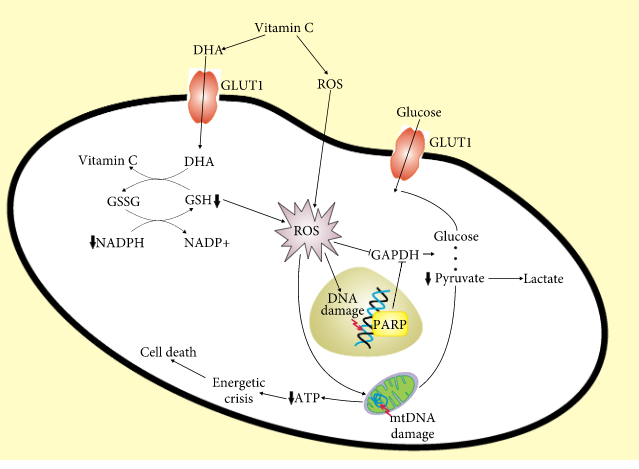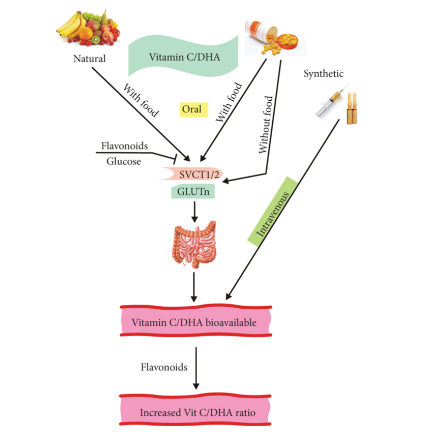Pharmacological Doses of Ascorbic Acid (Vitamin C) and its Pro-oxidant and Antioxidant Effects on Cancer
Cancer and Ascorbate Association
DNA can be harmed by reactive oxygen species and result in the growth aggregate, actuate disease change in cells. According to Pavlowska et al., vitamin C is an important antioxidant that can get rid of these reactive oxygen species ROS and stop cancer from growing.
Vitamin C is taken from natural dietary sources in multiple foods. The absorption and biological activity of this vitamin C are affected by a large number of other substances that are consumed concurrently. If vitamin C is given pharmacologically in high doses, this will prevent tumors in the cells as shown in different experiments. Because vitamin C has damaging effects on the cancer cells in the body of an organism.
Different derivatives of vitamin C are being used in anticancer studies as they have high lipophilicity and are resistant to oxidation.
Dehydroxyascorbate
Vitamin C in this form has been oxidized. It travels through the glucose transporters in the cells. Cancer cells do not generate energy through oxidative phosphorylation but rather through glycolysis. Cancer cells need a large amount of glucose, which is obviously transported by the gluts, if dehydroascorbate is given to the cell, it will bind the glucose transporters and limit the number of Gluts for binding and uptake of glucose by the cells. When cancer cells cannot take up much glucose, they will not be able to meet their basic energy needs and cannot survive. Ultimately the cancer cells will die. So, this derivative of vitamin C can be a promising therapy in targeting cancer cells (Corpe et al., 2005).

- By reducing their pluripotency, Vit C also significantly aids in the elimination of cancer stem cells.
- Metastasis is the most important hallmark of cancer cells. Cancer cells can metastasize by breaking the collagen molecules in the neighboring cells and penetrating them. But vitamin C promotes the formation of collagen, and hence, prevents metastasis of cancer cells which is an important point for cancer-related deaths (Hughes et al., 1971).
- Cancer cells require hypoxia-inducible factor HIF for their survival under low oxygen conditions. Vitamin C has the tendency to degrade HIF-1 so that cancer cells cannot survive low oxygen conditions.
- Dietary vitamin C activates the natural killer cells NKCs and T-cells of the immune system and stimulate them to act against cancers (Van et al., 2018).
Vit C Administration
Vitamin C is absorbed by the body in three different ways.
Food included
As an addition to one’s diet applied as a synthetic substance on its own.
This can be taken orally or intravenously.
Dose of ascorbic acid that is predicted in the safe for an individual human being is 2000mg/day. If a person is recommended a higher dose than this, then, that must be divided into smaller fractions and taken. The same amount of vitamin C that is taken orally and that is administered intravenously has different effects on the body. The amount of vitamin C that is administered intravenously is found to be six times more effective as compared to the same amount taken orally (Corpe et al., 2013).
Human trials
Numerous human trials have been conducted to test the efficiency of Vit C in treating different types of cancer. In a sizable French cohort study, the effects of intravenous Vit C therapy on 2482 patients with breast cancer were investigated. And to find out the link between breast carcinoma and vitamin C. data was collected for both the dietary and synthetic vitamin C effects that were given to the patients for a few years, but no significant outcome was obtained in this research study.
Another study was performed on 37 patients and some patients were given only dietary vitamin C while others were given both the dietary and supplementary vitamin C. it was found through the experimental finding that the patients who were taking only the dietary vitamin C, have a reduction in breast carcinoma to about 23%. While patients who were given both the dietary and supplementary doses of vitamin C showed a risk reduction of about 15% (van Gorkom et al., 2019).
A case study was also performed in which the breast cancer patent was given dietary vitamin C on the regular basis. It was determined that vitamin C and breast cancer have a strong relationship due to the reduced high risk in this instance.

Role of Vit C in Cancer
It is found that when vitamin C is administered intravenously, it has no effects on the normal body cells but only on the cancerous cells of the patient. Tumor cells can produce H2O2 when in contact with the ascorbic acid, which will cause oxidative stress in the cells and ultimately result in tumor cell death. Vitamin C has the capability to bring copper from the nuclei of peripheral lymphocytes in the blood to the tumor cells, this will cause damage to the DNA of tumor cells by generating ROS. More electrons will be transferred from the copper to vitamin C or ascorbic acid in cancer cells than in normal cells because of the higher copper content (Nishikimi et al., 1994). As a result, reactive oxygen species are formed inside the cell due to stress and it can trigger the apoptotic pathway. This intravenous injection of vitamin C will not affect the normal body cells as they contain very less amount of copper as compared to the cancer cells.
Conclusion
Vitamin C or ascorbic acid is taken as dietary or supplementary food. It is also being given in synthetic form for the treatment of different diseases particularly cancer. In this article, the mechanism of action of Vit C in relation to cancer and different human trials for tumors and Vit C are elaborated.
References
Corpe, C. P., Eck, P., Wang, J., Al-Hasani, H., & Levine, M. (2013). Intestinal dehydroascorbic acid (DHA) transport mediated by the facilitative sugar transporters, GLUT2 and GLUT8. Journal of Biological Chemistry, 288(13), 9092–9101. https://doi.org/10.1074/jbc.M112.436790
Corpe, C. P., Lee, J. H., Kwon, O., Eck, P., Narayanan, J., Kirk, K. L., & Levine, M. (2005). 6-Bromo-6-deoxy-L-ascorbic acid: An ascorbate analog specific for Na +-dependent vitamin C transporter but not glucose transporter pathways. Journal of Biological Chemistry, 280(7), 5211–5220. https://doi.org/10.1074/jbc.M412925200
Hughes, R. E., Hurley, R. J., & Jones, P. R. (1971). Retention of ascorbic acid by the guinea pig eye lens. Experimental Eye Research, 12(1), 39–43. https://doi.org/10.1016/0014-4835(71)90126-6
Nishikimi, M., Fukuyama, R., Minoshima, S., Shimizu, N., & Yagi, K. (1994). Cloning and chromosomal mapping of the human nonfunctional gene for L- gulono-γ-lactone oxidase, the enzyme for L-ascorbic acid biosynthesis missing in man. Journal of Biological Chemistry, 269(18), 13685–13688. https://doi.org/10.1016/s0021-9258(17)36884-9
Pawlowska, E., Szczepanska, J., & Blasiak, J. (2019). Pro- And antioxidant effects of Vitamin C in cancer in correspondence to its dietary and pharmacological concentrations. Oxidative Medicine and Cellular Longevity, 2019. https://doi.org/10.1155/2019/7286737
Van Gorkom, G. N. Y., Klein Wolterink, R. G. J., Van Elssen, C. H. M. J., Wieten, L., Germeraad, W. T. V., & Bos, G. M. J. (2018). Influence of Vitamin C on lymphocytes: An overview. Antioxidants, 7(3), 1–14. https://doi.org/10.3390/ANTIOX7030041
van Gorkom, G. N. Y., Lookermans, E. L., Van Elssen, C. H. M. J., & Bos, G. M. J. (2019). The effect of vitamin C (Ascorbic acid) in the treatment of patients with cancer: A systematic review. Nutrients, 11(5). https://doi.org/10.3390/nu11050977
